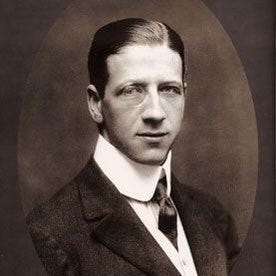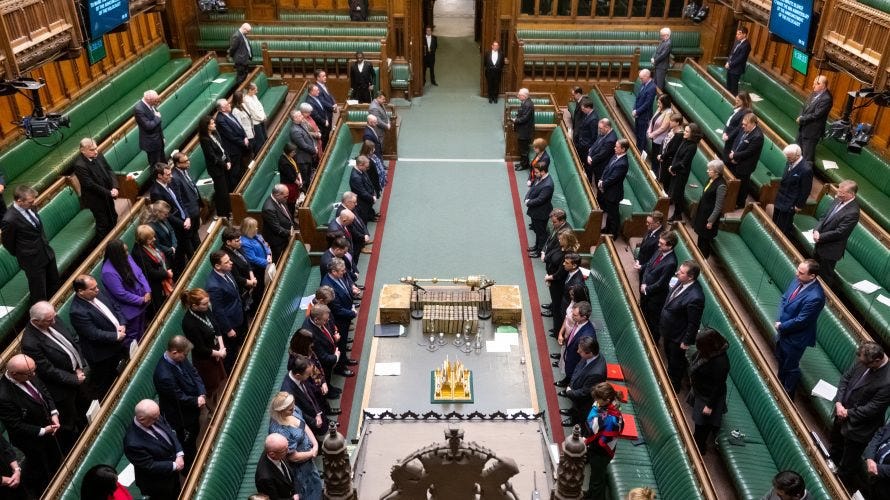The day Parliament fell silent.
A post recalling one of the most moving days in Parliament's long history: 17th December 1942.
Picture: The House of Lords, where the House of Commons was meeting at the time of the events in this article. After their own chamber was bombed, the Commons moved into the Lords’ chamber on 24th June 1941 and stayed there for nine years. Parliamentary copyright images are reproduced with the permission of Parliament.
The day Parliament fell silent
by Lee David Evans
‘Is it possible, Mr Speaker, for Members to rise in their places and stand in silence in support of this protest against disgusting barbarism?’
‘That should be a spontaneous act by the House as a whole,’ the Speaker replied.
MPs then rose and stood. In silence.
That remarkable exchange took place on 17th December 1942 when Anthony Eden, the Foreign Secretary, told the House of Commons what was becoming known about the holocaust. These were Eden’s words:
‘I regret to have to inform the House that reliable reports have recently reached His Majesty's Government regarding the barbarous and inhuman treatment to which Jews are being subjected in German-occupied Europe… German authorities… are now carrying into effect Hitler's oft repeated intention to exterminate the Jewish people in Europe. From all the occupied countries Jews are being transported, in conditions of appalling horror and brutality, to Eastern Europe. In Poland, which has been made the principal Nazi slaughterhouse, the ghettoes established by the German invaders are being systematically emptied of all Jews except a few highly skilled workers required for war industries. None of those taken away are ever heard of again. The able-bodied are slowly worked to death in labour camps. The infirm are left to die of exposure and starvation or are deliberately massacred in mass executions. The number of victims of these bloody cruelties is reckoned in many hundreds of thousands of entirely innocent men, women and children.’
Eden informed the House of a declaration, made by several allied nations, which asserted that ‘such events can only strengthen the resolve of all freedom loving peoples to overthrow the barbarous Hitlerite tyranny’ and pledged ‘those responsible for these crimes shall not escape retribution’.
Once Eden resumed his seat, the effect on MPs having been palpable, a series of pragmatic and often moving questions were asked. Sydney Silverman, Labour MP for Nelson and Colne, wanted to know who would be held responsible - just those giving orders, or everybody involved in the unfolding horror. Eden said ‘all persons who can properly be held responsible’ should be.
Reginald Sorensen, Labour MP for Leyton West, asked about the possibility of using ‘non-belligerent and neutral governments to secure the emigration of Jews’, something Eden said he would naturally welcome.
Next up was James de Rothschild, Liberal MP for the Isle of Ely:
‘May I express… the feelings of great emotion, the really grateful feeling that I am certain will permeate the Jewish subjects of His Majesty's Government in this country and throughout the Empire, at the eloquent and just denunciation which has just been made…? Among the Jewish subjects of His Majesty there are many today who have been in this country only for a generation or so. They will feel that, but for the grace of God, they themselves might be among the victims of the Nazi tyranny at the present time. They might be in those ghettoes, in those concentration camps, in those slaughter-houses. They will have many relations whom they mourn, and I feel sure they will be grateful… for this declaration.’
Finally, speaking about Jews suffering in Europe, he said:
‘I hope that when this news [of the declaration] goes to them they will feel that they are supported and strengthened by the British Government and by the other United Nations and that they will be enabled to continue to signify that they still uphold the dignity of man.’
Chips Channon, a famous unreliably diarist but who I think we may be able to trust on this occasion, recalled that de Rothschild’s voice was ‘vibrating with emotion… There were tears in his eyes and I feared that he might break down; the House caught the spirit and was deeply moved.’
The questions continued until William Cluse, Labour MP for Islington South, asked the Speaker whether the House could mark the occasion: ‘Is it possible, Mr Speaker, for Members to rise in their places and stand in silence in support of this protest against disgusting barbarism?’ It would seemingly be the first time such a thing had happened, but if the Commons wished to do so, said the Speaker, it could.
The Daily Mail’s Parliamentary correspondent wrote, ‘One after another MP stood until all… sombre-garbed and sombre-faced ranks were on their feet. I can tell you there were many eyes which were not dry and there was not, I dare swear, a throat without a lump in it.’
80 years to that memorable day, in 2022, the Commons repeated the act in remembrance of those who suffered and died in the holocaust (below).
Image: UK Parliament. Parliamentary copyright images are reproduced with the permission of Parliament.
Liked this post? Click the ‘heart’ below to help other people find it on Substack.






In December 1989 the House debates war crimes. Llin Golding (Lab, Newcastle-under-Lyme) recounted the experience of her father, Ness Edwards (Lab, Caerphilly), who was part of a parliamentary delegation to Buchenwald in 1945. Powerful stuff.
https://hansard.parliament.uk/commons/1989-12-12/debates/1e302ffd-deb6-49a4-8d50-95cfc772e228/WarCrimes#contribution-9f323e22-5357-4538-903c-6e566495f778